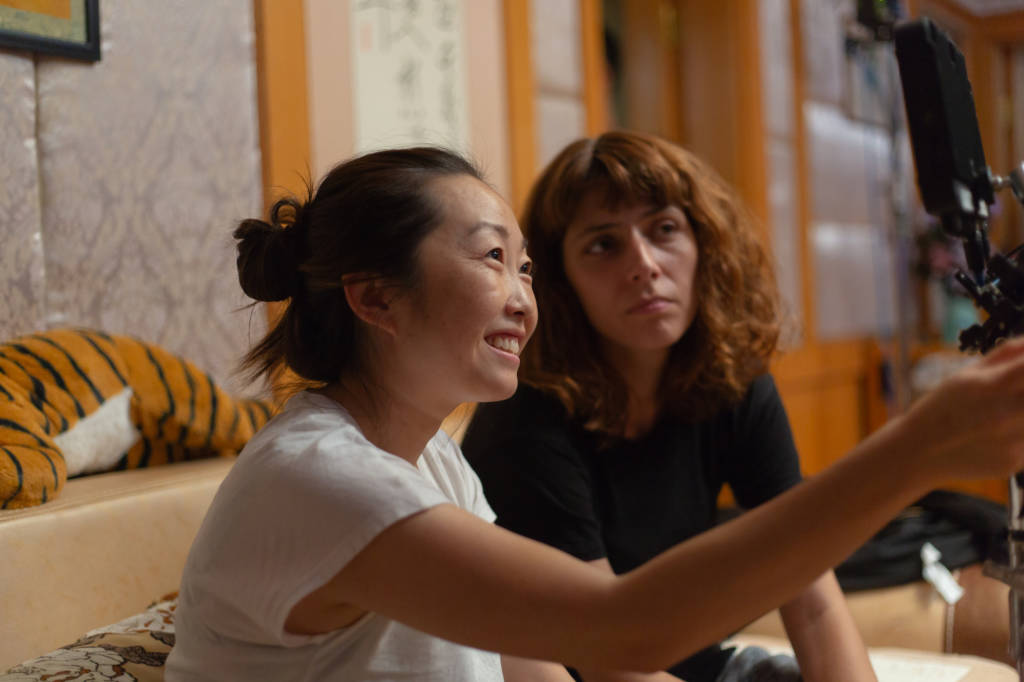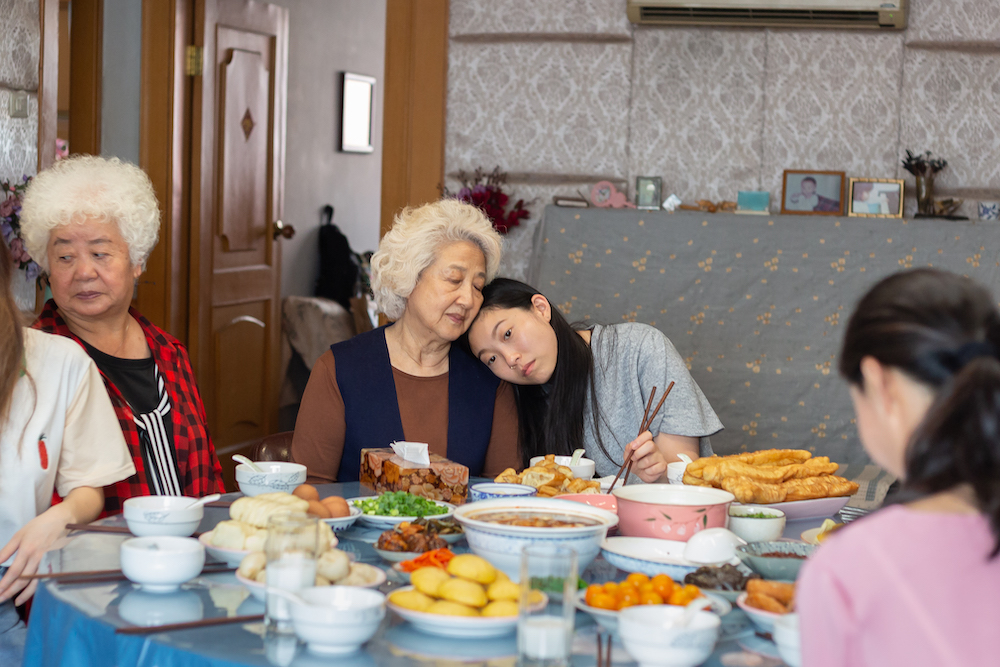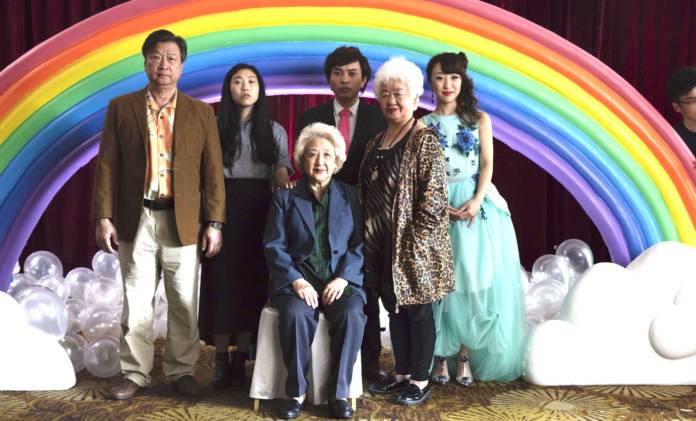Director Lulu Wang’s films are built on secrets and lies.
Her 2014 directorial debut, Posthumous, explores what happens when a struggling artist (Jack Huston), who learns that his work is more valuable after his “death,” concocts a shady scheme to reap the rewards of his “posthumous” success.
Her second and most recent movie, The Farewell (opening Friday), follows a young Chinese-American woman named Billi (Awkwafina), who returns with her family to China for what on the surface appears to be a big red envelope wedding.
But, in actuality, the wedding is just a ruse so the family can gather around its head matriarch, Billi’s beloved and terminally ill grandmother (Zhao Shuzhen), one last time. Complicating matters further, the family has decided not to tell Nai-Nai (grandmother in Chinese) about her impending fate.
The lying by omission to maintain Nai-Nai’s joyful spirit in her final weeks in this semi-autobiographical film hits close to home for Wang, whose own family has kept the director’s now 86-year-old grandmother from discovering her own dire health prognosis.
I spoke to Wang about her grandmother, her decision to keep her new film judgment-free, and how, looked at differently, lies can be another way of getting at the truth.
48 HILLS I have to start by asking, how is your grandmother doing now?
LULU WANG She does have cancer, but she’s still alive. She’s 86 and has outlived the doctor’s prognosis of three months to live. But she’s not doing great. It’s not a very positive story. She’s been around much longer and got to see me direct the movie but still doesn’t know.
Help us save local journalism!
Every tax-deductible donation helps us grow to cover the issues that mean the most to our community. Become a 48 Hills Hero and support the only daily progressive news source in the Bay Area.
48 HILLS When Billi says, in the film, that she thinks it’s wrong that her family keep this secret from her grandmother, her uncle tells her that while she’s been out West and has been influenced to think more independently, in China it’s all about putting the family’s happiness first. In other words, not telling Nai-Nai and watching her become dispirited is the best way to ensure everyone’s happiness.
As someone who’s lived in the East and the West, how have these opposing ways of thinking impacted your life?
LULU WANG I think it’s very complicated because, in many ways, yes, the Eastern philosophy is that the collective as a unit is more important than the individual, and it’s the way society functions, for the greater good.
But, at the same time, my parents left China to come to America to live the American dream and pull themselves up by their bootstraps to give me a better life. So, in many ways, they must also believe in the Western values of individualism and independence.
So yeah, I think it’s difficult, because I still struggle with it, like how much will I do for myself? How much do I do for my family and where do those two things intercept?

48 HILLS You don’t seem to judge those who choose to keep the secret from Nai-Nai as harshly as others might. Because the secret is never uncovered, no one gets into trouble and there’s no cathartic moment like there is at the end of films like “Tootsie,” “Secrets and Lies,” or “Can You Ever Forgive Me?”
LULU WANG Yeah, that’s where something is so fundamentally Western. Even this idea of “We’re writing a screenplay and a screenplay has to have a climax and it’s gotta have catharsis.” Says who? Life doesn’t work that way. We don’t oftentimes get catharsis, denouement, and resolution. I also think part of the drama and part of the climax is this desire for catharsis, and the more you want it, what does that do to a person?
So instead of having a real catharsis, I looked more for the moment the characters, who are performing joy, are performing a wedding for the sake of the grandmother, broke down and showed their humanity. When you are inauthentic, there comes a time when you just lose it and that’s a very human thing regardless of what culture you’re from and what you believe your behavior should be.
48 HILLS One of the interesting things that happens in the film is that a family with such different points of view can still come together. With politics tearing many families apart in 2019, this couldn’t be more timely.
LULU WANG I think, as an immigrant, I’ve always had to negotiate between two different cultures and different worlds, not just China and America, but also my family versus my friends, my school, and my own independence.
When I was younger, it used to be this push and pull, where it felt like a war between these two different sides. But as I get older, it’s about how to bring all of these things together. So this movie is very much that same kind of melding, of saying we don’t have to pick a side.
What most people say is that one thing has to be wrong so they can be right. I don’t want to contribute to that kind of divide, so I don’t want to make a film that’s ultimately about judgment. Instead, the film is an exploration of differences and not even about agreeing to these differences. It’s about how do you disagree in a respectful way. Maybe something is not right for you, but that doesn’t mean that it’s also wrong for them.

48 HILLS With both Posthumous and The Farewell, you’ve certainly demonstrated an interest in stories built around lies. What’s the appeal?
LULU WANG As a storyteller, I’m very interested in the stories that we tell each other and the stories that we tell ourselves to get through life. It’s the way that we are able to own our own narrative and justify decisions that we make. Guilt only exists through storytelling. If you tell yourself you don’t feel bad about that, then there’s no guilt, right? I believe that we all do it all the time and there’s nothing necessarily wrong with that. It’s just a survival mechanism.
I think in both stories, what I found is that even though people are lying, they’re getting at a greater truth. And the lie doesn’t take up all the importance. That in many ways, the lie is the surface and there are deeper truths to excavate that we can get to even though we may be telling a fiction.
And that’s what I do, too, right? I’ve made a fictionalized film. It’s autobiographical in some ways, but it’s a fictionalized version. But it was actually only through fictionalizing that I was able to get to some of the deeper truths.
THE FAREWELL
Opens Fri/19
Various Bay Area theaters
Tickets and more info here.






